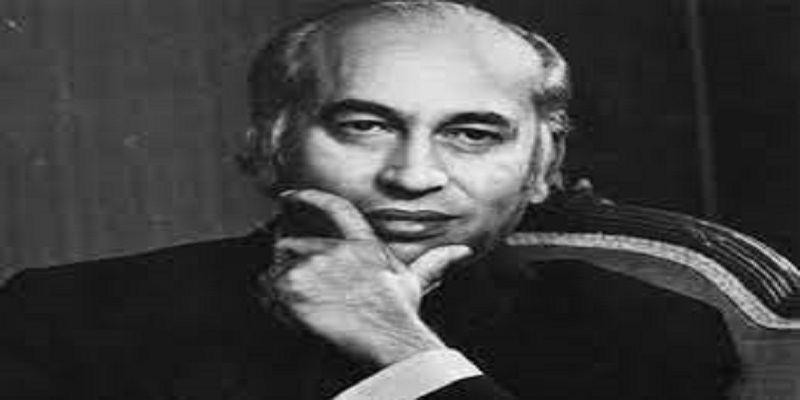Z.A. Bhutto Architect of Change and Controversy in Pakistan's Political Landscape
Zulfikar Ali Bhutto, commonly known as Z.A. Bhutto, was a prominent political figure in Pakistan who served as the President of Pakistan from 1971 to 1973. His tenure was marked by both significant achievements and controversies, and his impact on the country's political landscape is still felt today.
Z.A. Bhutto was born on January 5, 1928, into a prominent political family in Sindh, British India. His father, Sir Shah Nawaz Bhutto, was a prominent landowner and politician. Bhutto was educated at the University of Southern California in the United States and later at the University of California, Berkeley, where he earned a degree in political science. He then pursued higher education at the University of Oxford in the United Kingdom, where he studied law at Christ Church.
Returning to Pakistan, Bhutto entered the civil service but soon transitioned to politics. His initial political career took shape under President Ayub Khan, where he served as the country's Foreign Minister from 1963 to 1966. Bhutto's charisma, eloquence, and political acumen quickly set him apart, earning him a significant following.
However, Bhutto's relationship with Ayub Khan soured, leading to his resignation in 1966. Bhutto then founded the Pakistan People's Party (PPP) in 1967, a populist and left-leaning political party that aimed to address issues of social justice and economic inequality. The PPP gained widespread support, especially among the country's lower-income groups.
The 1970 general elections marked a turning point in Pakistan's political history. The PPP emerged as the single largest party in West Pakistan, while the Awami League, led by Sheikh Mujibur Rahman, secured a majority in East Pakistan. Bhutto and Mujib were the two key leaders, representing the country's west and east, respectively. The election results fueled tensions between the two leaders and their respective regions.
As negotiations failed to resolve the political deadlock, Pakistan plunged into a crisis that eventually led to the Bangladesh Liberation War in 1971. East Pakistan declared independence, leading to a conflict between the Pakistani military and Bangladeshi nationalists. The war resulted in the creation of Bangladesh, and Pakistan faced a humiliating defeat.
Amidst the crisis, President Ayub Khan resigned, and Bhutto emerged as a crucial political figure. In December 1971, Bhutto was appointed as the President of Pakistan, inheriting a fractured and disheartened nation. His presidency began during a turbulent period, with the aftermath of the war still haunting the country.
One of Bhutto's first challenges was to rebuild the nation and restore a sense of unity. He initiated efforts to mend ties with the international community, seeking assistance to address the humanitarian crisis caused by the war. Bhutto's leadership during this period was characterized by a combination of pragmatism and a commitment to national sovereignty.
Bhutto's presidency saw the drafting of a new constitution in 1973, which declared Pakistan a parliamentary democracy. The constitution sought to strike a balance between federal and provincial powers, reflecting Bhutto's commitment to addressing regional disparities and promoting a more inclusive political system.
Economic reforms were also a key focus during Bhutto's presidency. His government nationalized several key industries, including banking and major manufacturing sectors, with the aim of reducing economic inequality and promoting social justice. While these measures were applauded by some for challenging the dominance of the elite, they also faced criticism for their impact on economic efficiency and investment.
Bhutto's foreign policy during his presidency was characterized by efforts to strengthen ties with Muslim nations and improve relations with the Soviet Union. He played a crucial role in the formation of the Organization of the Islamic Conference (OIC), aimed at fostering solidarity among Muslim countries. At the same time, Bhutto pursued a policy of rapprochement with India, culminating in the signing of the Simla Agreement in 1972, which sought to normalize relations between the two neighbors.
Despite these achievements, Bhutto's presidency was not without controversy. His leadership style was often criticized for being authoritarian, and allegations of election rigging surfaced during the 1973 general elections. The opposition accused Bhutto of manipulating the political process to consolidate power, leading to growing dissent.
In 1977, widespread protests erupted against Bhutto's government, culminating in allegations of election fraud and corruption. The military, under General Muhammad Zia-ul-Haq, eventually seized power in a coup, ousting Bhutto from office. Bhutto was arrested and faced charges of conspiracy to commit murder. After a controversial trial, he was sentenced to death and executed on April 4, 1979.
Z.A. Bhutto's presidency was a complex chapter in Pakistan's history, marked by both achievements and controversies. His efforts to address economic disparities, promote social justice, and navigate the challenges of post-war reconstruction left an indelible impact on the country. However, the controversies surrounding his leadership, allegations of authoritarianism, and the tragic end to his political career continue to be subjects of debate and reflection in Pakistan's political discourse.

